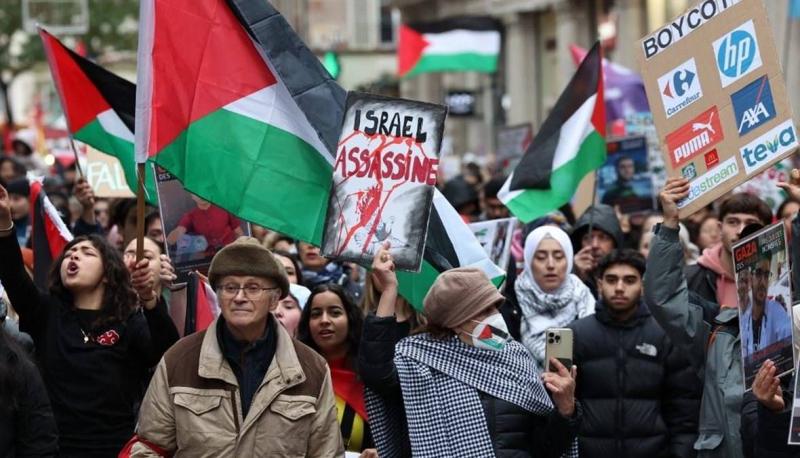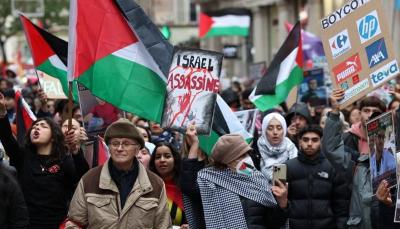European security officials expect an increase in the threat of militant attacks due to the war between Israel and the Palestinians, with "lone wolves" who are difficult to track posing the greatest risk. More than ten officials from intelligence and police in five European countries, including Britain, Germany, and France, told Reuters that they are enhancing monitoring of Islamist extremists. This adds additional strain on already burdened resources tasked with managing threats from Russia, China, and Iran, which Mark Rowley, chief of the London police, described as "the most challenging set of threats he has ever encountered."
A British security official suggested that the Gaza war could be the largest recruitment operation for extremists since the Iraq war in 2003, with calls for attacks on Jewish and Western targets increasing in Europe. An informed German source from intelligence indicated that threats to civilians are at their highest in modern German history due to risks posed by extremists, far-right groups, and Russia. Attacks carried out by extremists in France and Belgium last month resulted in three deaths, prompting these countries, along with Austria, Slovenia, and Bosnia and Herzegovina, to raise their levels of preparedness against terrorist threats. Italy has reinstated border restrictions with Slovenia, citing the risk of armed individuals entering the country. The British official remarked, "There will be backlash that we will feel for years."
The threat facing Europe now is likely very different.
*Lone Wolves*
Security officials state that the primary danger to Europe may come from attacks carried out by "lone wolves," extremist attackers often active online without formal ties to established organizations. The severity of the security threat depends on how long Israel continues its offensive in Gaza, launched in response to Hamas's attack on southern Israel on October 7, and the extent of damage inflicted on the region. Although a ceasefire is now in effect in Gaza, both sides have claimed that the war is not over.
Jochen Köble, head of Germany's largest police union, stated that security personnel are warning suspected extremists that they are under surveillance and conducting raids, but the main threat comes from individuals who "believe in ideas and act on them alone." He added, "Committing crimes is just a matter of time for these individuals... it’s not always about them having a bomb. They could drive into a crowd with a car or launch a knife attack." Köble suggested that upcoming Christmas markets could be potential targets, recalling an attack on a Christmas market in Berlin in 2016 that killed 12 people.
Many Muslims express outrage over the intensity of the Israeli assault, stating that European governments should have done more to rein in Israel. Peter Knob, former deputy director of policies for the Dutch national coordinator for counter-terrorism, indicated that European counter-terrorism officials found after the September 11 attacks that the best way to prevent attacks is a combination of military force and preventative measures based on understanding grievances and motivations. He noted that visits from leaders of Britain, France, and Germany to Israel last month fueled anger among some Muslims, as well as the tone of the rhetoric used by European leaders. Knob stated, "The result is that it will create a 'us versus them' sentiment among Muslim communities. It feels like we have not learned anything... I am deeply concerned when I see polarization and the language being used."
*Online Misinformation*
Muslim leaders in Europe report an increase in attacks on Muslims and mosques since the Hamas attack, citing a climate of fear exacerbated by the spread of misinformation online. Iman Atta, director of the group Tell Mama, which tracks anti-Muslim attacks in Britain, said, "I have never seen such a level of polarization in our community." German official Köble noted that a network of Islamist Salafists has re-emerged, and a new group of pro-Hamas influencers has appeared on Instagram and TikTok.
A number of extremist groups, such as ISIS and al-Qaeda, have called for attacks in the West and violence against Jews, although intelligence officials say the overall threat from these organizations has diminished. Europol reported that only two of 16 "terror attacks" in the EU last year were carried out by "jihadists." Thirteen were attributed to individuals associated with leftist and anarchist groups, while one attack was carried out by someone affiliated with a far-right group. Thomas Renard, director of the International Center for Counter-Terrorism, stated that "what we are facing now is a more widespread and diverse threat." He added that there is more radicalization occurring online compared to venues such as mosques.




